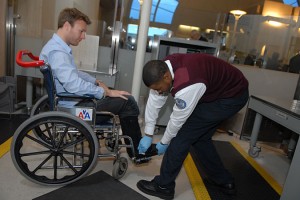As people are traveling home from their summer vacations, it is helpful to know what to expect when arriving at the airport. Travelers with disabilities that use AT devices may have additional concerns about how their devices will be screened by the Transportation Security Administration (TSA).
I recently attended a webinar entitled ‘Travelers with Disabilities and Medical Conditions’. Even though I myself have traveled extensively, I was not aware of all of the resources TSA offers for travelers with disabilities.
TSA has resources available to support and educate travelers with disabilities to make sure they are prepared for the screening process. For instance, TSA Cares has a toll free helpline, 1-855-787-2227, to assist travelers with disabilities and their families before they even arrive at the airport. This hotline helps travelers know what to expect for the screenings that are relevant to the traveler’s specific disability at the security checkpoint. They can help answer questions about medically necessary liquid, diabetes, metal joint implants, mobility disabilities, and respiratory equipment. They can also arrange checkpoint assistance or training for travelers with disabilities and their families. Some of the trainings include a mock boarding program where travelers with disabilities can familiarize themselves with the airport and screening process before flying.
At every airport, there are also Passenger Support Specialists (PSS) available near all checkpoints to provide proactive assistance to travelers with disabilities. PSS personnel are Transportation Security Officers and Supervisors who have received special training on disability etiquette, civil rights and assisting and resolving concerns of travelers. Now that I know there are PSS Supervisors at most checkpoints, I will tap into that resource if I need assistance with resolving any issues concerning my disability.
Below are some helpful tips for travelers with disabilities:
· Arrive at the airport early
· Know your needs and communicate your needs
· Separate medically necessary liquids and disability-related devices from your other property
· Request a private screening, if desired
· Request that a traveling companion stay with you during screening
· Request the assistance of a Passenger Support Specialist (PSS)
If you need to contact TSA’s Disability Branch, please email [email protected]. If you have a civil rights complaint, contact the Office of Civil Rights & Liberties, Ombudsman and Traveler Engagement. Visit www.tsa.gov for more information.
Have you found TSA to be helpful when you have traveled? How have you and/or your AT been treated during air travel? Put your experiences in the comment box below and thanks for sharing.





